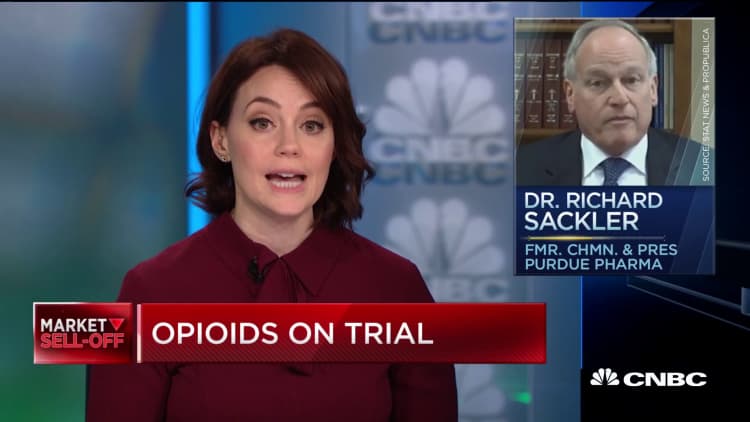The Supreme Court on Monday refused to hear an unusual case brought by the state of Arizona against the embattled Sackler family and their pharmaceutical company, Purdue Pharma.
Arizona alleged in its petition to the top court that the Sacklers, who have become embroiled in the nation's opioid epidemic over their signature drug OxyContin, unlawfully transferred billions of dollars out of their company in order to avoid liabilities stemming from thousands of lawsuits filed against them.
The state accused the the Sacklers of transferring $4 billion to themselves since 2008, and at least another $2 billion to companies under their control, in violation of a fraud statute on the books in 43 states. The Sackler family has denied Arizona's allegations.
The court announced that it will not hear the case in an order with no explanation and no noted dissents.
Purdue filed for bankruptcy in September as part of a tentative deal, valued at between $10 billion and $12 billion, to settle more than 2,000 opioid lawsuits filed by local governments, Native American tribes and states. The deal involves the Sackler family giving up $3 billion from their personal fortune.
Roughly half the states support the deal.
As part of the bankruptcy proceedings, a federal judge granted Purdue and the Sacklers temporary legal protection from civil suits brought by state and local governments. Purdue and the Sacklers argued that the order applied to Arizona's Supreme Court fight, but the state said it did not and asked the court to take up the matter nonetheless.
OxyContin, a painkiller, is one of the most common drugs involved in prescription opioid deaths in the United States, according to the Centers for Disease Control and Prevention.
Purdue Pharma is facing lawsuits in nearly every U.S. state over its aggressive marketing of the drug. More than 200,000 people died of overdoses related to prescription opioids between 1999 and 2017, government data shows.
The suit filed by Arizona was a long shot. While the vast majority of cases come to the justices after being ruled on by the lower courts, the state argued that the top court had what's called "original jurisdiction" over the case, known as State of Arizona v. Richard Sackler, which would give it the ability to be the first court to review the matter.
Arizona argued that the court had original jurisdiction over the case because one of the parties involved was a state. The state argued that even if the court did not find that it has original jurisdiction, the case's exceptional importance merited review.
"Due to the magnitude of the opioid crisis across our country, we are disappointed that we cannot bring our claims directly in the Supreme Court," Arizona Attorney General Mark Brnovich said in a statement on Monday. "
"Today's ruling will not end our efforts to hold Purdue and the Sacklers accountable for their role in the opioid crisis. We will continue to fight for Arizona's interests in the Purdue bankruptcy proceedings," he said.
In addition to Richard Sackler, the suit also named Theresa Sackler, Kathe Sackler, Jonathan Sackler, Mortimer Sackler, Beverly Sackler, David Sackler and Ilene Sackler Lefcourt.
In a statement, Purdue said it was "pleased that the Supreme Court has declined to take the case, as we believe that bankruptcy court is the appropriate forum to maximize the value of the company."
"Through chapter 11, we continue to make important progress on reaching a settlement that can provide more than $10 billion in value to address the opioid crisis and save lives," the company said.
A spokesperson for members of the Sackler family said in a statement: "We welcome today's decision by the Supreme Court. We continue to believe the most effective way to get critical resources to those who need them most is through the bankruptcy process and the proposed settlement that has been supported by 29 states and territories and thousands of municipalities across the country."
Correction: Roughly half the states support the settlement deal involving Purdue Pharma and the Sackler family. An earlier version misstated the number of states.



